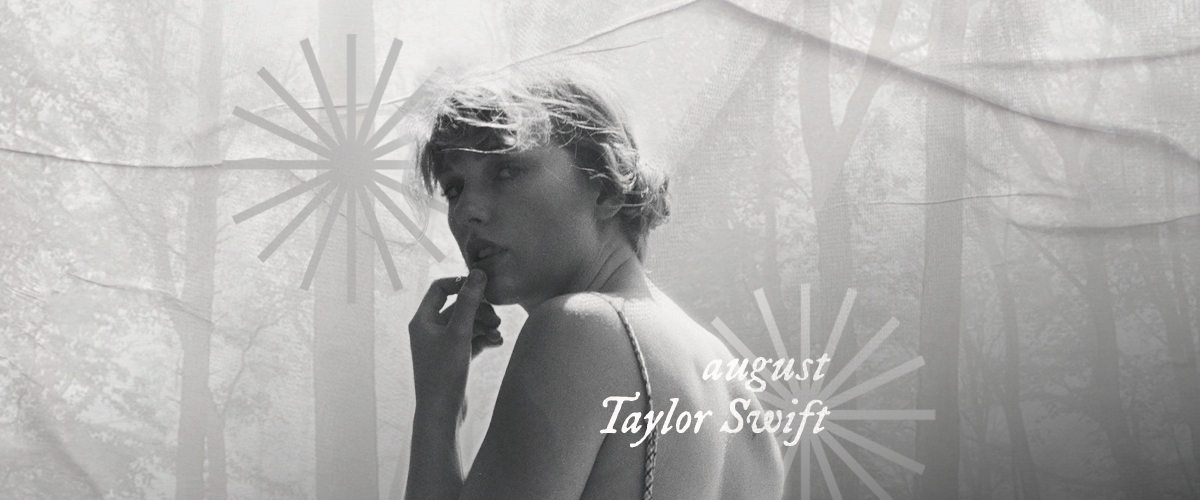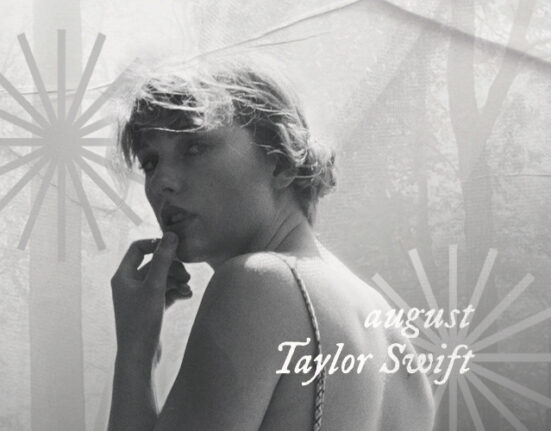“SALT air and rust on your door…”
As the calendar flips to August, Taylor Swift’s melancholic anthem resurfaces, once again taking over the playlists of both devoted Swifties and casual listeners alike.
The ballad, simply titled august, was part of the 2020 folklore album by Taylor Swift, which echoes the seasonal themes of spring and summer, accompanied by a cottagecore feel.
The song falls on the summer-set tracks of the album as a part of a trilogy that includes “cardigan” and “betty.”
Together, they tell the story of a love triangle from three different perspectives: Betty, the main love interest featured in “cardigan”; James, the boy caught between two romances, as heard in “betty”; and Augustine, the so-called “other woman” with whom James had a fleeting summer affair.
She is our main protagonist in august— a song that has come to symbolize the ache of unrequited and almost love.
But beneath august’s dreamy tune and wistful lyrics lies something deeper— a feminist undercurrent that allows “the other woman” to have a voice in the whole affair.
The narrative space in pop music has long been dominated by the male perspective and shaped by patriarchal undertones. Often, we hear the voice of the person who was betrayed—typically casting the “other woman” as a villain.
Even Taylor Swift’s early songwriting wasn’t exempt. In “Better Than Revenge” from her Speak Now album, Swift originally sang:
“She’s better known for the things that she does on the mattress”
But in the re-recorded version, the line was changed to:
“He was a moth to the flame, she was holding the matches.”
The revision reflects a growing awareness of how misogynistic ideas were once deeply embedded in our thinking—so much so that even women like Swift had internalized them.
Today, there’s a stronger cultural push to interrogate those narratives and offer more compassionate, complex portrayals of women.
And august is an example of this resistance. In this narrative, Swift handed the mic to the girl who is almost always silenced in stories about love triangles— the “other woman.”
But instead of painting her in the lens of a villain or a seductress, Swift lets her speak in wistful tones, in nostalgic rhythms, full of tenderness and heartbreak that resonate to many of us— including those who never experienced being another woman.
Swift presents Augustine with nuance and empathy, showing that the “other woman” isn’t a villain, but a fully human figure whose heartbreak is just as real—and just as devastating—as any great love story.
Through this lens of empathy, august becomes more than a sad summer song—it becomes a feminist act of reclaiming emotion.
Affective Feminism
Drawing from Sara Ahmed’s affective feminism, Augustine’s longing, shame, and hope are not dismissed as weakness, but understood as political forces that challenge how we value women’s emotional experiences.
Affective Feminism is a feminist concept developed by Sara Ahmed, a British-Australian scholar of the feminist framework.
In her work, The Cultural Politics of Emotion, Ahmed challenges the idea that emotions are merely personal, private, and apolitical. For her, emotions are deeply embedded into the social world. They “stick” to certain bodies, circulate in public discourse, and shape how people are read, treated, and disciplined.
For example, “longing” is an emotion that sticks with those we call “other women.” Their longing— or desire for the married man— is not allowed the dignity of permanence. It is viewed as socially unacceptable, delusional, and even immoral.
But for men, this emotion— the longing for women— even when they are married faces less scrutiny and shame. Sometimes, it’s even excused: Wala eh, lalake. Ganyan talaga, lalake, as though having self-restraint is expected more from women than men.
Yet Swift, by letting Augustine tell her side of the story, challenges this cultural script. Augustine doesn’t hide her longing and desire for James— she flaunts it in the song.
“Back when we were still changin’ for the better // Wanting was enough
For me, it was enough// To live for the hope of it all”
This is Affective Feminism at work. It argues that emotions are not only political but also revealing: they expose the expectations, exclusions, and hierarchies of the world we live in.
Within this framework, Augustine can be read as a feminist reclamation of the stigmatized emotional terrain.
Her voice isn’t filtered through judgment or mockery. Instead, she is allowed a full affective range— the tender hope (“Will you call when you’re back at school?”), the aching nostalgia (“Back when we were still changin’ for the better // Wanting was enough”) and the bitter acceptance (“You were never mine to lose”).
Through showcasing Augustine’s emotions, Swift doesn’t let her be disposable in the Betty-James-Augustine narrative. She’s not just the other woman. She’s a human being capable of loving— and being hurt— by someone. She elevates her emotional experience as worthy of attention— not erasure, not villainization.
This aligns with Ahmed’s ideas that emotions can be tools of feminist consciousness. When women narrate their longing, when they say “I waited,” or “I hoped,” they are resisting the cultural script that tells them such feelings are weak, embarrassing, or wrong.
They are asserting that their emotional lives have depth, legitimacy, and insight into the structures that shape their pain.
Furthermore, Augustine’s quiet suffering also critiques the masculinist impulse to simplify or erase female complexity. The song doesn’t offer a triumphant closure—it sits with the unresolved ache, the “almost.”
In a culture that demands women either win the man or walk away empowered, august dares to dwell in emotional ambiguity.
And that is profoundly feminist.
For the hope of it all
Allowing women to feel— as is and without censorship— is in itself a strong feminist act. And this is what Taylor Swift did in august.
In a culture that demands women to either stay quiet or move on, august refuses closure and insist on sitting with the uncomfortable and unresolved feelings. It does not offer a resolution— just an echoed hope as Swift repeatedly sang “For the hope of it all” until the music fades away.
That act of holding space for emotional ambiguity, without casting judgment or demanding a moral lesson, is powerful. It resists the cultural impulse to flatten women into cautionary tales or side characters.
This emotional complexity is what affective feminism calls for: a politics that takes feelings seriously, especially those feelings that have been dismissed as irrational, excessive, or shameful.
By letting Augustine’s longing be heard—not corrected—Swift affirms that vulnerability isn’t weakness. It’s resistance.
And in doing so, august reclaims the emotional landscape as a site of feminist power.
How useful was this post?
Click on a star to rate it!
Average rating 5 / 5. Vote count: 3
No votes so far! Be the first to rate this post.
We are sorry that this post was not useful for you!
Let us improve this post!
Tell us how we can improve this post?







